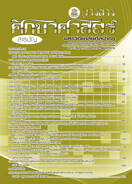กระบวนการเปลี่ยนแปลงสู่ความเป็นเมือง : บทสำรวจความรู้เพื่อเตรียมความพร้อมในการจัดการศึกษาของไทย
Main Article Content
บทคัดย่อ
Urbanization: Study on Thai Educational Preparation
This research aims to study how urbanization significant for Thailand and having impacts on the sector of education from looking through the global experiences. The methodology applied in this research is a qualitative analysis. The research finds that the urbanization in Thailand is highly dynamic and trends to a more rapid growing comparing to some other regions. However, there are more or less risky factors that are needed to be considered to resolve. The risky factors are explained in 3 points. First, the regional discrepancy shows the existence of inequalities in certain areas, particularly between Bangkok and the Southern regions. The urbanization that grows without efficient management can be perilous and aggravate the problematic issues of the people’ s well-being and accessibility to the basically necessary public provisions. Second, the rise of the middle class results in more needs for urban infrastructure and public services, on top of the basic necessities. Third, while most of the sprawls are expanding without any controlled regulation, the fluctuations in the costs of infrastructure, public services, and land utilization cause financial difficulties to change the budget distribution. This spoils the energy consuming as well as creates an unnecessary extra-cost for infrastructure investment.
The impacts of urbanization on the sector of education are analyzed in 3 aspects. They are: the growths of accessibility to learning and maintaining the learning status, the growths of public budgeting and financing for education in both demand and supply, and the Western educational management approach is increasingly applied to the teaching and learning at schools. This research suggests 2 possible ways for the policy implementation to cope with the future urbanization. They are: enhancing the potentiality to manage the cities according to their levels of development, and specifying the levels of development including considering the autonomy in public administration.


